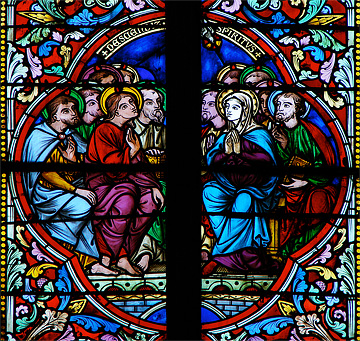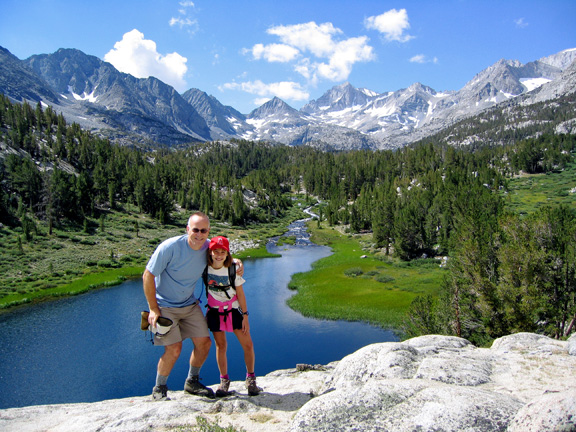In yesterday’s post I gave a brief overview of some basic facts about Pentecost:
What is Pentecost?
What does the word “Pentecost” mean?
What actually happened on the day of Pentecost?
Should we believe that all of this actually happened?
How is Pentecost related to Pentecostal Christians?
How do Christians celebrate Pentecost?
Today I’ll reflect on the spiritual significance of Pentecost. I will be writing as a Christian, and though my comments are addressed primarily to my fellow believers, they may be of interest to others as well.
So, then, what difference does it make for us today that the first Christians were filled with the Holy Spirit almost two millennia ago on the Jewish festival of Pentecost?
There is no simple, one-size-fits-all answer to this question, because Pentecost knits together several themes, emphases, and experiences. I will suggest four possible ways that Pentecost matters today. Two of these I’ll develop today. The other two I’ll save for Monday.
1. The Presence and Power of the Spirit
 On the day of Pentecost, seven weeks after the resurrection of Jesus, the Holy Spirit was poured out upon those followers of Jesus who had gathered together in Jerusalem. What happened on the first Pentecost continues to happen to Christians throughout the world today, though usually not in such a dramatic fashion. We rarely get a heavenly wind and tongues of fire anymore. Nevertheless, God pours out the Spirit upon all who put their faith in Jesus Christ and become his disciples (see Romans 8:1-11). (Photo: A stained glass window from the Meaux Cathedral in Meaux, France. Public domain.)
On the day of Pentecost, seven weeks after the resurrection of Jesus, the Holy Spirit was poured out upon those followers of Jesus who had gathered together in Jerusalem. What happened on the first Pentecost continues to happen to Christians throughout the world today, though usually not in such a dramatic fashion. We rarely get a heavenly wind and tongues of fire anymore. Nevertheless, God pours out the Spirit upon all who put their faith in Jesus Christ and become his disciples (see Romans 8:1-11). (Photo: A stained glass window from the Meaux Cathedral in Meaux, France. Public domain.)
Christians are meant to live in the presence and power of the Spirit of God. The Holy Spirit helps us to confess Jesus as Lord (1 Cor 12:3), empowers us to serve God with supernatural power (1 Cor 12:4-11), binds us together as the body of Christ (1 Cor 12:12-13), helps us to pray (Rom 8:26), and even intercedes for us with God the Father (Rom 8:27). The Spirit guides us (Gal 5:25), helping us to live like Jesus (Gal 5:22-23).
Personal Implications: Pentecost presents us with an opportunity to consider how we living each day. Are we relying on the power of God’s Spirit? Are we an open channel for the Spirit’s gifts? Are we attentive to the guidance of the Holy Spirit? Is the fruit of the Spirit (love, joy, peace, etc.) growing in our lives? Most Christians I know, including me, live in the presence and power of the Spirit, but only to an extent. We are limited by our fear, our sin, our low expectations, not to mention our tendency to be distracted from God’s work in us. Pentecost offers a chance to confess our failure to live by the Spirit and to ask the Lord to fill us afresh with his power.
2. The Central Role of the Church in God’s Work in the World
On Pentecost, the Holy Spirit descended on individual followers of Jesus as they were gathered together in Jerusalem. This gathering became the first Christian church. New believers in Jesus were baptized as they joined this church. They, along with the first followers of Jesus, shared life together, focusing on teaching, fellowship, breaking of bread, and prayer. They shared their belongings so that no one was hungry or needy. As these first Christians lived out their new faith together, “the Lord added to their number those who were being saved” (Acts 2:47). Thus we speak of Pentecost as the birthday of the church.
In theory, the Spirit could have been poured out on the followers of Jesus when they were not gathered together. There are surely times when the Holy Spirit touches an individual who is alone in prayer and worship. But the fact that the Spirit was given to a gathering of believers is not incidental. It underscores the centrality of the church in God’s work in the world. The actions of the earliest Christians put all of this in boldface. The Holy Spirit is not only given to individuals, but also, in a sense to the gathered people of God. Thus, in 1 Corinthians 3, the Apostle Paul observes that the church is God’s temple and that the Spirit dwells in the midst of the church (3:16-17; in 1 Cor 6:19-20 we find a complementary emphasis on the dwelling of the Spirit in individual Christians).
Personal Implications: Many Christians, especially those of us who have been influenced by the individualism of American culture, live as if the church is unnecessary. We seem to believe that as long as we have a personal relationship with God, everything else is secondary. But Pentecost is a vivid illustration of the truth that is found throughout Scripture: the church is central to God’s work in the world. Thus, Pentecost invites us to consider our own participation in the fellowship, worship, and mission of the church. It is a time to renew our commitment to live as an essential member of the body of Christ, using our gifts to build the church and share the love and justice of Christ with the world.
On Monday I’ll suggest two other ways that Pentecost can impact us today.

